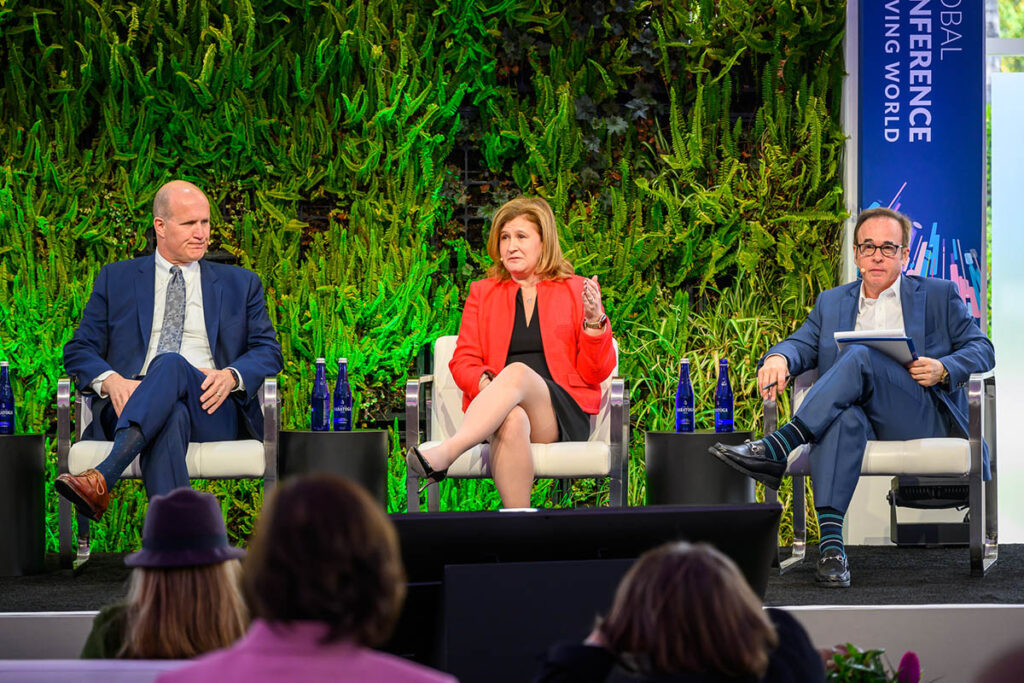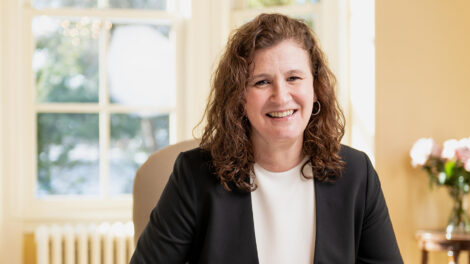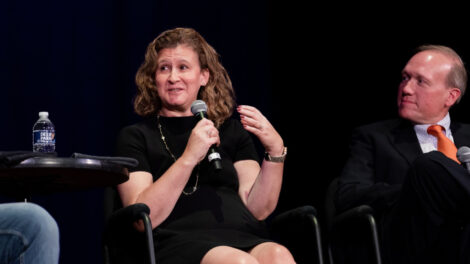President Hurd joins higher-ed panel at prestigious Milken Institute Global Conference
By Bryan Hay
President Nicole Hurd on Tuesday (5/2) questioned the arguments that a college degree is not worth the investment and advocated for education’s power in creating opportunity during a panel discussion on higher education at the 26th annual Milken Institute Global Conference, which attracts leaders from around the world in numerous sectors of the economy.
Hurd was joined by Gene Block, chancellor of UCLA; Jim Gash, president of Pepperdine University; and Eric Gertler, executive chairman and CEO of U.S. News & World Report, in a wide-ranging hourlong conversation on “Access, Outcomes, and Value: Envisioning the Future of Higher Education.”

President Nicole Hurd speaks alongside Jim Gash, president of Pepperdine University, and Eric Gertler, executive chairman and CEO of U.S. News & World Report, during the Milken Institute Global Conference.
Moderated by Jeff Selingo, an Atlantic magazine contributor and author of the bestseller Who Gets In and Why: A Year Inside College Admissions, the discussion addressed a lost faith in the value of a college degree, declining enrollment, free speech on campuses, access, the complexities of applying to college, and the debate over the value rankings, among other topics.
Selingo opened the discussion by noting the rise in employers in some sectors that are not requiring a four-year degree, and that colleges and universities lost more than a million potential students during the height of the pandemic. Despite these trends, he said, a bachelor’s degree remains an incredibly valuable commodity.
“The best investment you can make in yourself is getting that four-year degree,” Hurd responded. “Nobody will ever take it away from you; you will not have it repossessed; it will not lose its value.”
However, she observed, a rising narrative in public discourse seeks to diminish the value of a four-year degree.
“It is absolutely the best investment you will ever make in yourself, your children, and your grandchildren,” Hurd said. “We’ve got to stop letting this anti-intellectual conversation happen.”
“If you look at breaking family cycles of poverty, nothing is more effective than education. If you look at access to health care, it goes up if you have a college education. If you look at voting participation, it goes up if you have a college education,” she noted.

President Nicole Hurd speaks alongside Jim Gash, president of Pepperdine University, during the Milken Institute Global Conference.
Recalling her career before Lafayette working to help low-income, first-generation, and underrepresented students enroll in higher education, Hurd stressed the need to let people know that they are welcome on campuses.
“I spent 15 years going to high schools, saying the four words all of us need to hear, which are ‘I believe in you,’” she said. “They don’t think that they can go to college, because again, back to this public discourse, we’ve told them it’s too expensive.
“We’ve made it too hard,” Hurd said. “We’ve left all sorts of talent on the sidelines as a country that needs to compete. And as a country that needs to have more participation in our democracy, we cannot leave huge swaths of students behind.”
Asked about the value of studying the humanities, Hurd said it creates a sense of community and empathy, and inspires critical thinking.
“I know college presidents aren’t supposed to say the ‘L’ word. But I’m going to go there, the sense of love and empathy,” she said.
“The liberal arts is where you get that space. I love every day that I wake up on a campus where professors are teaching philosophy and ethics, and teaching religious studies and teaching history,” Hurd said, describing the cross-pollination of ideas and deep thinking that occurs at Lafayette whether in engineering or the humanities.
Hurd compared Lafayette students to sparks that become fireworks resulting from the liberal arts tradition.
“You cannot produce fireworks unless you get broad exposure,” she said. “And what a liberal arts education does is give you that breadth of exposure. You do the critical thinking so you can understand. I think the world would be a much better place, frankly, if we had more students thinking about humanities, not because they’re looking for a job, but they’re looking for a way to look at the world and understand that world that will allow them to be the kind of leaders we need them to be.”
Watch the entire panel discussion.
Lafayette College also had representation at this year’s Milken conference among its alumni community: Bennett Goodman ’79, executive chairman of Hunter Point Capital, Chip Bergh ’79 H ’22, president and CEO of Levi Strauss & Company, and Simmone Taitt ’04, founder and CEO of Poppy Seed Health.
The Milken Institute Global Conference attracts thought leaders who confront challenges across public health, business and industry, and society and culture. The Milken Institute, a nonprofit, nonpartisan think tank, was founded by financier Michael Milken with a mission to improve lives around the world by advancing innovative economic and policy solutions.

